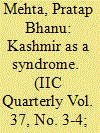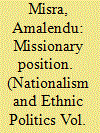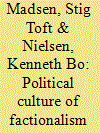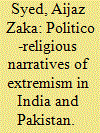| Srl | Item |
| 1 |
ID:
105282


|
|
|
| 2 |
ID:
108928


|
|
|
|
|
| Publication |
2011.
|
| Summary/Abstract |
The purpose of this article is to critically examine the politics of religious conversion in India. Since Christianity is the main religion espousing and conducting conversion in ever-larger numbers in India, my focus, in the following pages, is to interrogate the debate surrounding this particular undertaking and the attendant conflict dynamics. This study is organized according to the following framework. First, it situates religious conversion in the context of radical Hindu nationalism. Second, it explores the issue of religious conversion in the theories of identity and globalization. Third, it probes the specifics of Christian conversion in India and investigates the issue within the framework of identity politics and secularism. Fourth, it examines the response and reaction of the radical Hindu nationalists towards religious conversion in general and Christian conversion in particular from the perspective of ethno-religious nationalism. Fifth and finally, it evaluates the dimensions of conflict between Christians and Hindus and how they are played out in the shared social arena.
In conclusion, this article stresses that religious conversion in India is a form of a socioeconomic emancipatory undertaking. Those who feel stifled by the discriminatory caste order prevalent within Hinduism and live a marginal existence embrace this new identity. In the same breath it argues that Christianity in general, and Christian missionaries in particular, have courted criticism, opposition, and violence from radical Hindus, informed citizenry, and the institution of the state, as they are considered an "external other"-accused of undermining the complex sociopolitical order in the country.
|
|
|
|
|
|
|
|
|
|
|
|
|
|
|
|
| 3 |
ID:
088366


|
|
|
|
|
| Publication |
2009.
|
| Summary/Abstract |
The experience of international migration is generally found to turn migrants into culturally hybrid communities. Yet, migrant communities often hold on to their religious moorings even as they relocate. From the 1970s onwards, the emerging leadership of Hindu settlers in Denmark consciously tried to transfer with them what they saw to be key aspects of Hinduism as they migrated to Denmark. In 1985, Hindus organized a major conference to position the Vishwa Hindu Parishad (World Hindu Council) as the umbrella organization for Hinduism in Denmark. Later on they established a Temple of Indians called Bharatiya Mandir to provide a place of worship for local Hindus. The philosophy behind the temple conformed to the nondenominational Hindu nationalist vision of Hindus as a unified community. This article, which contrasts the aim of Hindu nationalism with the on-the-ground realities of Hindu mobilization in Denmark, reveals that two major factions spearheaded Hindu nationalist endeavors in Denmark from the 1980s until 2006. The two factions successfully launched several projects, and even collaborated in their execution, but the initiatives were beset with rivalries that hampered the communal unity they had set out to achieve. The authors analyze this factional rivalry as an expression of Indian political culture, arguing that tensions among Hindu activists in Denmark is an instance of the political factionalism prevalent in the Indian subcontinent. The unintended emergence of such factionalism represents the successful transfer of a core element of Indian political culture to a new locale through Hindu nationalist politics. The authors base their argument on field observations since the 1980s, recent interviews with key religious players, and more than two hundred pages of written materials that offer a rare entry point to the study of Hindu nationalism ex situ.
|
|
|
|
|
|
|
|
|
|
|
|
|
|
|
|
| 4 |
ID:
111195


|
|
|